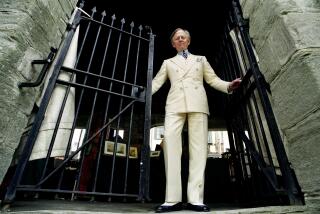Thomas Wolfe
- Share via
J.R. Moehringer does not mention in his interesting article on the declining reputation of Thomas Wolfe (“Fading Embers of Thomas Wolfe,” Jan. 15) that a critical cloud hung over Wolfe even during his own brief lifetime: He lacked a certain writerly control over his prodigious material and so had to rely heavily on his gifted editor, Maxwell Perkins of Scribner’s. Wolfe’s work was his own, to be sure, but his sense of novelistic form did not match his wonderful ability to evoke the emotions and images of the scenes from his own life.
Many can attest, as I can, that Wolfe’s “Look Homeward, Angel” is a powerful experience for romantic adolescents (boys, mostly) just coming of age. But it’s not surprising that some modern critics find that Wolfe ranks low as a novelist, although they seem strangely malicious about it.
CLYDE SPILLENGER
Venice
*
Last fall on our maiden retirement road trip around the country, my husband and I drove down the Blue Ridge Parkway to Asheville, N.C. While walking around the downtown, we happened upon the Wolfe house 20 minutes before closing time. Raced through and upon leaving, I purchased “Look Homeward, Angel.” I was wowed, so I checked out “Of Time and the River” from our library. I was bowled over. Now I have a 3 1/2-pound bag from the bookstore containing “You Can’t Go Home Again,” ’The Web and the Rock” and “The Hills Beyond.” My advice: Don’t wait until you’re retired to read Thomas Wolfe.
JANE ROBERTS
Redlands
More to Read
Sign up for our Book Club newsletter
Get the latest news, events and more from the Los Angeles Times Book Club, and help us get L.A. reading and talking.
You may occasionally receive promotional content from the Los Angeles Times.










